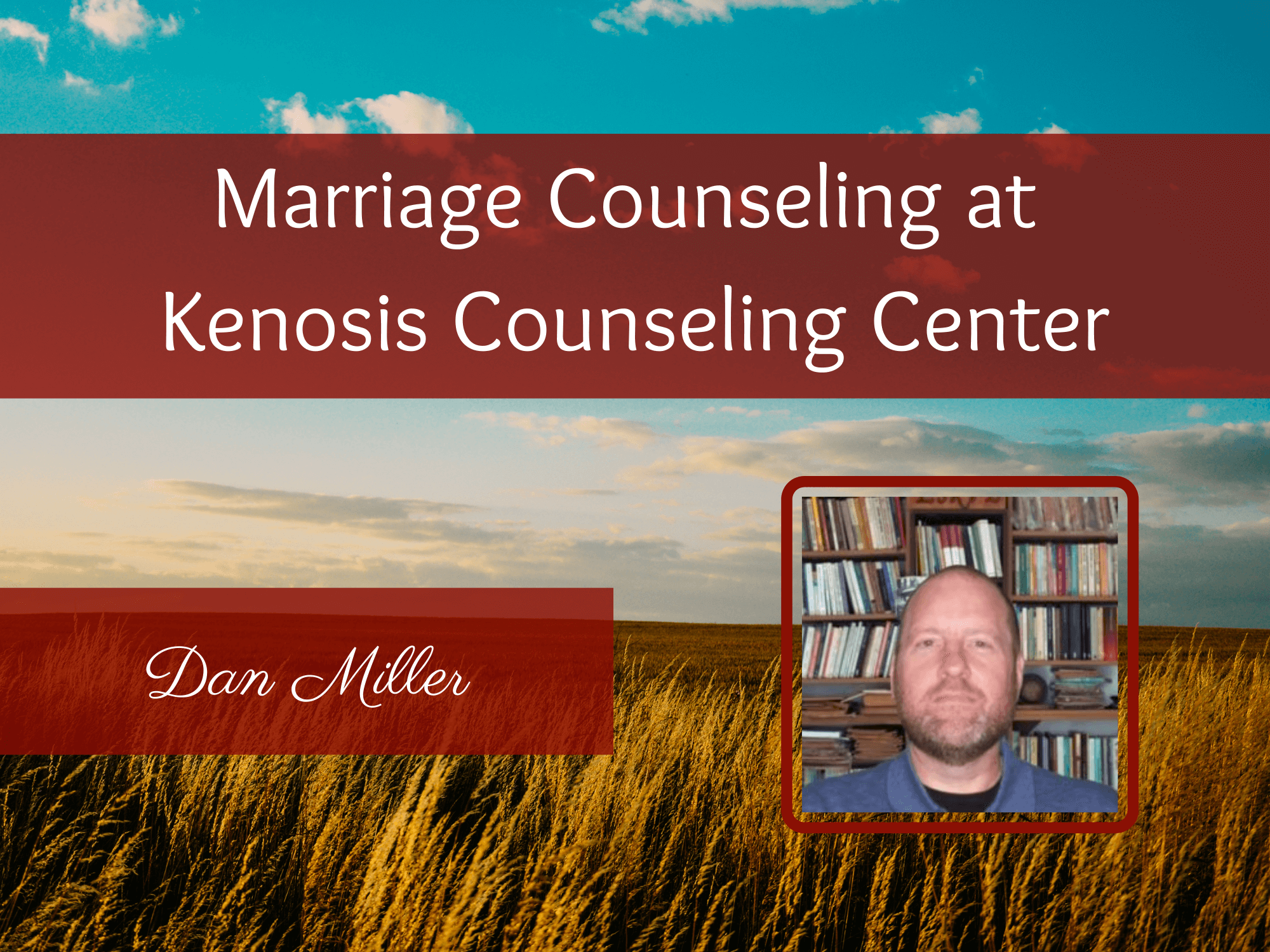Marriage isn’t always easy. Relationships go through ebbs and flows and couples sometimes find themselves in serious disagreements or have lost touch with one another. If you find yourself having problems with your spouse, you don’t have to go through it alone. Marriage counseling helps couples in all stages of life repair and restore the relationship.
Our therapists are dedicated to your wellness and future. Kenosis Psychotherapist and Behavior Analyst Dan Miller is no different. Dan emphasizes hope and healing within a positive psychology framework while recognizing environmental, social, and cultural factors in overall health and wellbeing. We had the privilege of sitting down with Dan to chat about his work at Kenosis, his standpoint on marriage counseling, and we got into the nitty-gritty of what it’s like to be in marriage counseling.
Getting to Know Dan
Dan is unique in the fact that he was an architect for 25 years before pursuing therapy work. Unfortunately, the Great Recession in 2010 ended his architectural career and forced Dan to reinvent himself. He remembers, “I got out the old graduate catalog, and as I was looking through, I was reminded of how much I’ve always enjoyed psychology. It’s always been an interest of mine.” That was when he decided to work towards his first Master’s degree in Applied Behavior Analysis, which he received in 2014. He says, “I have the option to always go back to architecture, but I’m in love with therapy. So this is where I choose to stay.”
He started as an intern at Kenosis while completing his second Master’s degree in Mental Health Counseling in 2018. He mentions, “I just fell in love with the place. So I completed my internship, my practicum, and then came aboard as an associate soon after.”
Dan does a little bit of everything in his therapy practice, but he especially enjoys marital counseling and working with clients with autism. Dan explains, “My first Master’s degree is in behavioral psychology with a special focus on autism. So I tend to get the privilege of working with individuals and families in that capacity.” Oftentimes, both marital counseling and autism overlap.
Dan also works with gifted individuals who are struggling with twice-exceptionality, as well as struggling from a mental health standpoint. He says, “It was at the encouragement of Christine that I began working with the gifted. She knows that I was captured as gifted when I was very young, and she thought I would have a unique perspective on the challenges of folks who are twice-exceptional and gifted.”
As you can see, Dan has a broad range of experience working with different individuals, making him a well-rounded counselor at Kenosis.

Getting Started in Marriage Counseling
Kenosis provides each new client with an initial assessment to get some background information on each person. The goal is to bring into sharp relief problems, issues, and challenges that bring them to counseling in the first place. Dan says, “I will share personal accounts with the clients if it’s going to benefit them therapeutically. But otherwise, I very much customize my approach to each client to meet their needs.”
On the marital counseling side, Dan loves the complexity of working with two individuals who have melded their lives together and are going through challenges. He says, “One common theme is that they have drifted apart; they’re not as close of friends as they have been. Their communication often is suspect, but mostly, they’ve drifted apart, and they become roommates as opposed to lovers.” As part of the assessment process, he meets for about 45-minutes with each person individually, then all three of them come back together and formulate a game plan for marital therapy.
Dan loves the feeling of making a difference in people’s lives. He describes his role at Kenosis as, “I am helping to solve problems to get people into a better headspace so that they cannot just function but thrive.”

Who Should Go To Marital Counseling?
According to relationship and marriage expert Dr. John Gottman, couples wait for an average of six years of being unhappy before getting help. That’s what Dan considers to be “crisis mode”, where the couple is desperate for a solution. While that statistic may be staggering, Dan says, “It’s not too late to go to marital counseling. As long as there is still a willingness to try and all hope is not gone, then I think counseling can be beneficial.”
Dan recalls working with a newlywed couple; this was a second marriage for both of them. They were struggling with weaving their lives together, so they decided to start marriage counseling. Dan says, “They became my favorite couple because, in part, they were so amenable to the therapeutic process. They were really eager to learn and to grow, which was great. For them, it was a little bit more serious than a tune-up. But they approached each counseling session with alacrity and purpose, and I’m glad to say that the therapeutic process worked out very well for them. They are still happy and are thriving as a couple.” Recognizing the need for marital counseling early on, and both parties being open to the process is the key to success.
Often, one person in the relationship panics and wants the relationship to continue, so they drag the other person to therapy. In those cases, Dan sometimes faces resentment or animosity from the person who doesn’t want to be there. He mentions, “I have a couple that I’m working with right now. That’s exactly the situation where the gentleman is very desperate and wants the marriage to endure, and the female basically has one foot out the door. That gives therapy about a 50/50 shot of making any difference, and that is difficult to do.” This is the part of the job that is difficult for Dan when he recognizes that the client is stagnating and there’s no growth or increased self-actualization. Both individuals need to express the same willingness to fight for the marriage.

How Does Dan Work with Someone Who’s Less Motivated?
Dan pays close attention to the body language of his clients, whether in a marital counseling scenario or in individual counseling sessions. It’s a challenge to work with less motivated clients, but he tries to reinforce the benefits of therapy, such as increased self-awareness and improved quality of life in clients who are willing to put in an effort.
Referring to the couple he is working with right now, Dan says, “It’s interesting to watch the dynamics of this couple. The woman will sit at the end of the couch, kind of turned away from her husband, and the husband is constantly moving over on the couch trying to get closer to her. That kind of speaks for where they’re at in their own heads at this point in time. And so, you work to rekindle their friendship first and foremost. That is the key. The foundation of successful marriages is a very strong friendship between husband and wife.”

He finds that humor plays a role in his sessions, too. He comments, “It’s very serious business that we do. But I noticed that a little humor can make the clients feel more comfortable, more relaxed, and more willing to open up.” That ties back to the goal of marital counseling, which is to bring back the foundation of friendship between the couple. Humor brings out their personalities and how well they mesh together.
Kenosis Founder and co-owner Dave Shields brings up an interesting study: “If a couple, no matter how badly they’re doing, still has a sense of humor about things, it’s a reflection of their resiliency.” So, when Dan jokes around a little bit, he can analyze how the couple receives it and see how much hope there is for the relationship.
The goal for Dan is to get people to be more willing to open up to him. He considers himself an empathetic person and a very effective listener. He uses that approach with people who are less motivated to be in counseling. Dave compliments Dan by saying, “One of Dan’s obvious traits that I think really helps at the beginning of therapy sessions is folks learn very quickly that he simply cares about them, and that can go a long way with building trust and rapport. He’s got a genuine heart for this kind of work, and folks pick that up fairly quickly.” People can tell when someone is being disingenuous. Dan has an authentic desire to help, and his clients understand that.
Dan’s Advice About Therapy
Dan says, “I think this is dissipating somewhat, but there’s a stigma that if you attend therapy, there’s something truly wrong with you. People seek out counseling for varied reasons, and it doesn’t necessarily imply some deep-seated pathology. Oftentimes, it’s about just day in and day out challenges in life. One thing I try to do is sort of de-pathologize.” Seeking counseling doesn’t mean there is something wrong with you. In fact, it means just the opposite. It means that you recognize the need for professional help with a challenge in your life.
We briefly talked about the difference between in-person and virtual counseling. With the rise of technology and social distancing, virtual counseling has become more popular. However, Dan has a different perspective: “I’ve done very few telephone sessions, and I find that to be difficult and not as productive.” Virtual counseling may be an adequate substitute, but he prefers in-person counseling. That way, he can better read body language, and there are fewer distractions.
Dan wraps it up by mentioning, “I’ve always said that everyone could use a little bit of couch time.”

